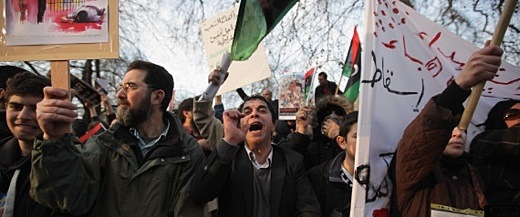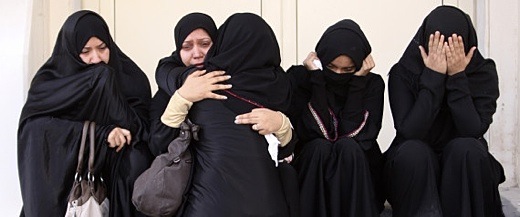 Image above: Protesters in Libya before killings. From original article.
Libyan protesters seeking to oust longtime leader Moammar Gadhafi defied a crackdown and took to the streets in five cities Thursday on what activists have dubbed a "day of rage," amid reports at least 20 demonstrators have been killed in clashes with pro-government groups.
Image above: Protesters in Libya before killings. From original article.
Libyan protesters seeking to oust longtime leader Moammar Gadhafi defied a crackdown and took to the streets in five cities Thursday on what activists have dubbed a "day of rage," amid reports at least 20 demonstrators have been killed in clashes with pro-government groups. New York-based Human Rights Watch said Libyan internal security forces also have arrested at least 14 people. Hundreds of pro-government demonstrators also rallied in the capital, Tripoli, blocking traffic in some areas, witnesses said.
An opposition website and an anti-Gadhafi activist said unrest broke out during marches in four Libyan cities – Beyida, Benghazi, Zentan, Rijban and Darnah. Organizers were using social networking sites like Facebook and Twitter to call for nationwide demonstrations.
"Today the Libyans broke the barrier or fear, it is a new dawn," said Faiz Jibril, an opposition leader in exile.
Opposition website Libya Al-Youm said four protesters were slain by snipers from the Internal Security Forces in the eastern city of Beyida, which had protests Wednesday and Thursday. It's not clear when the protesters were killed. The website also said there was a demonstration Thursday in Benghazi, Libya's second-largest city, and that security forces had shot and killed six people with live ammunition.
Switzerland-based Libyan activist Fathi al-Warfali said 11 protesters were killed in Beyida on Wednesday night, and scores were wounded. He said the government dispatched army commandos to quell the uprising.
Libya Al-Youm said that protesters set out Thursday after the funeral for those killed a day earlier toward the State Security building, chanting "Free Libya, Gadhafi get out!"
Mohammed Ali Abdellah, deputy leader of the exiled National Front for the Salvation of Libya, said that hospitals in Beyida were complaining of a shortage in medical supplies, and that the government has refused to provide them to treat an increasing number of protesters.
Abdellah quoted hospital officials in the town as saying that about 70 people have been admitted since Wednesday night, about half of them critically injured by gunshot wounds.
Gadhafi's government has moved quickly to try to stop Libyans from joining the wave of uprisings in the Middle East that have ousted the leaders of Egypt and Tunisia. It has proposed the doubling of government employees' salaries and released 110 suspected Islamic militants who oppose him – tactics similar to those adopted by other Arab regimes facing recent mass protests.
An autocrat who has ruled for more than 40 years, Gadhafi also has been meeting with tribal leaders to solicit their support. State television reported Tuesday that Gadhafi spoke with representatives of the Ben Ali tribe, one of Libya's biggest clans and one that has branches into neighboring Egypt.
Tripoli residents said they were having trouble accessing the Internet, although it was not clear whether access had been blocked or the bandwidth reduced. At the height of the protests in Egypt last month, the government shut down the Internet for five days in a bid to curb the protesters' ability to organize.
The official news agency JANA said Thursday's pro-government rallies were intended to express "eternal unity with the brother leader of the revolution," as Gadhafi is known.
Witnesses in the capital said many government supporters were raising Libyan flags from their cars and chanting slogans in favor of Gadhafi. They said it was otherwise business as usual in the capital and stores remained open.
But protests already have turned violent.
Al-Warfali, head of the Libyan Committee for Truth and Justice, said two more people were killed in another city, Zentan, on Thursday while one protester was killed in Rijban, a town about 75 miles (120 kilometers) southwest of Tripoli, where power was shut down Wednesday night and remained off Thursday.
A video provided by al-Warfali of the scene in Zentan showed marchers chanting and holding a banner that read "Down with Gadhafi. Down with the regime."
He said protesters on Thursday in the coastal city of Darnah were chanting "the people want the ouster of the regime" – a popular slogan from protests in Tunisia and Egypt – when thugs and police attacked them from a vegetable market.
Another video showed protests by lawyers in Benghazi on Thursday demanding political and economic reform while a third depicted a demonstration in Shahat, a small town southwest of Benghazi.
The Libyan government maintains tight control over the media and the reports couldn't be independently confirmed.
Libya's Muslim Brotherhood, an opposition group in that country as it has been in Egypt, denounced the crackdown.
In a statement Wednesday night, it accused "the security forces and members of the revolutionary committees of using live ammunition in dispersing the protesters." The group demanded that "the Libyan regime rein in its (security) apparatus."
Police storm Bahrain protesters - Take capital sites By Hadeel Al-Shalchi on 17 February 2011 for AP/Huffington Post - (http://www.huffingtonpost.com/2011/02/17/bahrain-protests-police-s_n_824404.html)
 Image above: Protesters in Libya before killings. From original article.
Army patrols and tanks locked down the capital of Manama, Bahrain, in this tiny Gulf kingdom after riot police swinging clubs and firing tear gas smashed into demonstrators, many of them sleeping, in a pre-dawn assault Thursday that uprooted their protest camp demanding political change. Medical officials said four people were killed.
Image above: Protesters in Libya before killings. From original article.
Army patrols and tanks locked down the capital of Manama, Bahrain, in this tiny Gulf kingdom after riot police swinging clubs and firing tear gas smashed into demonstrators, many of them sleeping, in a pre-dawn assault Thursday that uprooted their protest camp demanding political change. Medical officials said four people were killed.
Hours after the attack on Manama's main Pearl Square, the military announced on state TV that it had "key parts" of the capital under its control and that gatherings were banned.
The developments marked a major crackdown by the island nation's rulers to put an end to days of protests inspired by Egypt's revolt against Hosni Mubarak. Tiny Bahrain is a pillar of Washington's military framework in the region. It hosts the U.S. Navy's 5th Fleet, which is a critical counterbalance to Iran's efforts to expand its clout in the region.
The capital Manama was effectively shut down Thursday. For the first time, tanks and military checkpoints were deployed in the streets and army patrols circulated. The Interior Ministry warned Bahrainis to stay off the streets. Banks and other key institutions did not open, and workers stayed home, unable or to afraid to pass through checkpoints to get to their jobs.
Barbed wire and police cars with flashing blue lights encircled Pearl Square, the site of anti-government rallies since Monday. Police cleaned up flattened protest tents and trampled banners inside the square, littered with broken glass, tear gas canisters and debris. A body covered in a white sheet lay in a pool of blood on the side of a road about 20 yards (meters) from the landmark square.
Demonstrators had been camping out for days around the square's 300-foot (90-meter) monument featuring a giant pearl, making it the nerve center of the first anti-government protests to reach the Arab Gulf since the uprisings in Tunisia and Egypt.
The protesters' demands have two main objectives: force the ruling Sunni monarchy to give up its control over top government posts and all critical decisions, and address deep grievances held by the country's majority Shiites who claim they face systematic discrimination and are effectively blocked from key roles in public service and the military.
But among Bahrain's rulers, the prospect of a prolonged crisis raised fears of a potential flashpoint between Iran and its Arab rivals in the Gulf. Bahrain's ruling Sunni dynasty is closely allied to Saudi Arabia and the other Arab regimes in the Gulf. Shiite hard-liners in Iran have often expressed kinship and support for Bahrain's Shiite majority, which accounts for 70 percent of the island's 500,000 citizens.
The police assault came early Thursday with little warning. Mahmoud Mansouri, a protester, said police surrounded the camp and then quickly moved in.
"We yelled, 'We are peaceful! Peaceful!' The women and children were attacked just like the rest of us," he said. "They moved in as soon as the media left us. They knew what they're doing.".
No comments :
Post a Comment